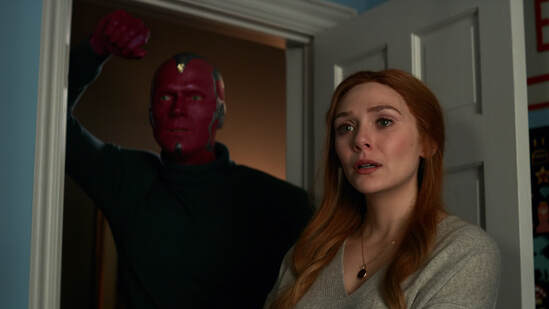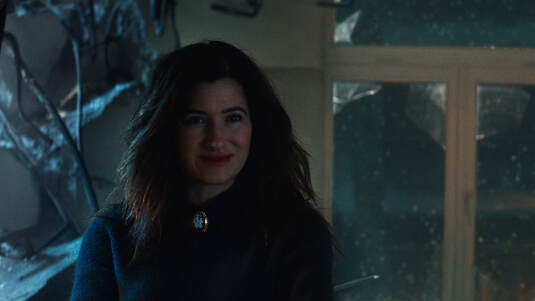Written by Shae Rufe  WandaVision was a groundbreaking Marvel story, for the single solid reason that its sole focus was on trauma. By now, many of us have seen the show and many of us have been discussing this very concept, which how could we all not? The fact that this show actively didn’t have a main villain is something that isn’t often done. Yes, okay, sure, we could say that Hayward was the villain or that Agatha was the big evil baddie, maybe even Wanda herself was up to no good. All of which are valid points, but realistically, no, there isn’t a villain, not a psychical one anyway. Trauma could be given the total of villain, yet that doesn’t quite seem right either. Is it so wrong to have a show with no clear antagonist? Or do we have to have the big baddie at the end to be satisfied with a show’s ending? Genuinely, when I first watched this show, I wasn’t too impressed at first. I know, I know, I really shouldn’t have been so quick to judge. The fact is, it started out so oddly different from everything else, that I didn’t quite connect with it at first. Still, I didn’t quit on the show and I am really glad I didn’t. The show itself delves into some serious explorations on trauma, especially in the last few episodes. And, as some of you may know, I am no stranger to trauma. Having a loved one die is a really horrible experience, but watching them die right in front of you? Well, there still aren’t words that can fully describe that. Unlike Wanda, I didn’t watch the love of my life die multiple times. I did however lose one of the single closest people to me in my life, and I can honestly say there is no getting over it. To have a show openly address the grief of losing loved ones in such a creative way is a nice change. Yes, Wanda’s journey is sad; she runs and hides from her grief and does everything she can to avoid confronting it. She also experiences PTSD with Vision and Pietro. Yet all of what Wanda does is exactly how a lot of people process loss. Grief isn’t linear. It’s not just going from one stage to the next, often times its multiple to all stages hitting you at once. Wanda even said it herself: “It’s just like this wave washing over me again and again. It knocks me down and when I try to stand up, it just comes for me again.” If that isn’t the perfect definition of grief, I really don’t know what is. There is no magical cure for grief, there’s not an instruction manual on how to handle it, and it’s often overlooked in a lot of media. The ugly truth is that grief is all consuming and suffocating and it’s this torturous cycle. It’s a helpless void that drags you down and swallows you whole. Wanda didn’t just lose Vision, her life was filled with loss, and then she was alone. Perhaps that is the most overlooked thing about grief, it’s very lonely. Wanda was forced to deal with all of this on her own, and so her coping mechanism was a reflection of her comforts, American Television Sitcoms. It’s easy to cling to what we know and what we can control, and often that looks like rewatching the same shows we’ve seen a billion times over to help with the anxiety of everything else. Wanda created her own world and brought the love of her life back, knowing full well all of it wasn’t real. Did she also accidentally imprison a bunch of innocent people in the process? Yes, but that is also a part of grief. It’s actually common to lose friends because of grief, often you push people away, and others don’t fully understand what you’re going through, so they pull away. Typically, strangers don’t end up being mind controlled into playing along, but you know the symbolism is pretty spot on.  Agatha is often seen as the antagonist to the show, and I actually disagree with this entirely. Agatha’s existence is more than just being a baddie. She forces Wanda to relive her traumas and losses, and to an extent, helps her to realize she’s more than just her grief. Although, killing Sparky was over the line and that will never be forgiven! The loss of Sparky was, however, the first forced confrontation of grief that Wanda had to experience. That act forced her to explain to her kids that you can’t run from grief, just because you don’t like it. Okay, a bit hypocritical, maybe? The thing about trauma is, yes, it’s often hypocritical. Those experiencing it will often give the best advice on how to handle and deal with it to other people, while we ourselves struggle with it. Agatha is a great foil to Wanda in the sense that they’re both incredibly powerful people who’ve handled loss and betrayal very differently. Also, I do not recommend forced exposure therapy. Just as a bit of a side note here. WandaVision probably had the most real depiction of trauma in the entire MCU. I’m sure that statement alone just had a lot of people yelling about Tony and his trauma being shown throughout the entire MCU as well. But Tony’s trauma is different from Wanda’s. We finally got to see a character deal with death and loss in an open and raw way through misguided coping skills. That is the truth of it. Grief isn’t simple, it’s ugly, and it’s masked, hidden, and ignored until it boils over. “What is grief, if not love persevering?” Pain. WandaVision brought a great aspect to tragedy and awareness to suffering in a unique and interesting way through avoidance and showed us that coping isn’t so black and white. It’s earned itself a rewatch in my books and hopefully helps others not feel so alone. I know it helped me.
0 Comments
|
Archives
December 2024
|
|
© 2012-2025, Nerds That Geek LLC.
All Rights Reserved. |
uWeb Hosting by FatCow

